

Projects. Sherry Turkle: Connected, but alone? 5 tips for mentoring in a virtual world. When face-to-face meetings for mentoring and coaching sessions aren’t an option, most people would turn to telephone calls, Skype, or Google Hangouts.
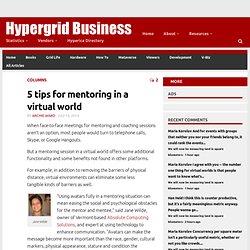
But a mentoring session in a virtual world offers some additional functionality and some benefits not found in other platforms. For example, in addition to removing the barriers of physical distance, virtual environments can eliminate some less tangible kinds of barriers as well. Jane Wilde. REVIEW: The changing space of the workplace – virtual worlds, collaboration, and democratic spaces. For millennia architects have been keenly aware of the forces acting on a structure on which they worked – as the physical forces acting on these structures created both centrifugal (outward throwing) and centripetal (inward throwing) forces.
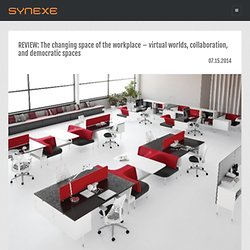
So too, in their work on the construction of physical spaces to structure the way people engaged with one another and the built environment, architects have long focused on the ways in which certain types of space create certain types of movement and interaction. Linear routes are thus suited for movement while more centroidal places are suited to assembly. Patients tell more secrets to virtual humans. Patients are more willing to disclose personal information to virtual humans than to actual ones, likely because computers don’t make judgments or look down on people the way another human might.
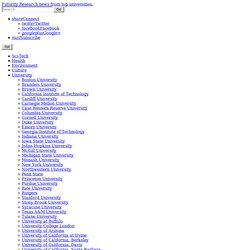
The findings show promise for people suffering from post-traumatic stress and other mental anguish, says Gale Lucas, a social psychologist at University of Southern California’s Institute for Creative Technologies. In intake interviews, people were more honest about their symptoms, no matter how potentially embarrassing, when they believed that a human observer wasn’t in on the conversation. “In any given topic, there’s a difference between what a person is willing to admit in person versus anonymously,” Lucas says. The study provides the first empirical evidence that virtual humans can increase a patient’s willingness to disclose personal information in a clinical setting.
It also presents compelling reasons for doctors to start using virtual humans as medical screeners. Virtual humans Source: USC. #review: Technologically Mediated Embodiment. This is the first post in a new Cyborgology series we call #review.
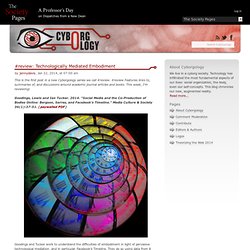
#review Features links to, summaries of, and discussions around academic journal articles and books. This week, I’m reviewing: Goodings, Lewis and Ian Tucker. 2014. “Social Media and the Co-Production of Bodies Online: Bergson, Serres, and Facebook’s Timeline.” Media Culture & Society 36(1):37-51. The future of work is rich in technology and drawbacks. The nature of work and the workplace itself is changing for most of us.
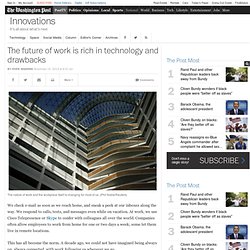
(Phil Noble/Reuters) We check e-mail as soon as we reach home, and sneak a peek at our inboxes along the way. We respond to calls, texts, and messages even while on vacation. At work, we use Cisco Telepresence or Skype to confer with colleagues all over the world. Companies often allow employees to work from home for one or two days a week; some let them live in remote locations. A New Workplace Manifesto: In Praise Of Freedom, Time, Space, And Working Remotely. The conventional idea of luxury is the antithesis of work.
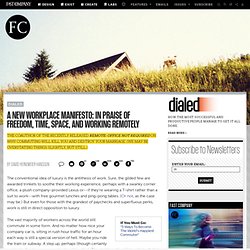
Sure, the gilded few are awarded trinkets to soothe their working experience, perhaps with a swanky corner office, a plush company-provided Lexus or--if they're wearing a T-shirt rather than a suit to work--with free gourmet lunches and ping-pong tables. (Or not, as the case may be.) But even for those with the grandest of paychecks and superfluous perks, work is still in direct opposition to luxury.
The vast majority of workers across the world still commute in some form. And no matter how nice your company car is, sitting in rush hour traffic for an hour each way is still a special version of hell. The transparent avatar in your brain: Thomas Metzinger at TEDxBarcelona. Does fantasy offer mere escapism, or escape? – Damien Walter. The only people who hate escapism are jailers, said the essayist and Narnia author C S Lewis.
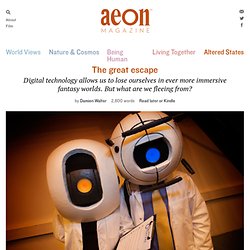
A generation later, the fantasy writer Michael Moorcock revised the quip: jailers love escapism — it’s escape they can’t stand. Today, in the early years of the 21st century, escapism — the act of withdrawing from the pressures of the real world into fantasy worlds — has taken on a scale and scope quite beyond anything Lewis might have envisioned. I am a writer and critic of fantasy, and for most of my life I have been an escapist.
Online students and teachers are no different from the rest of academia. My name is David Newton, professor of business studies.
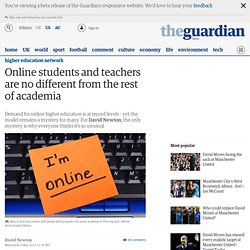
I'm an online higher education tutor. Some of you may read that last sentence as a confession, rather than a simple statement of fact. Web.media.mit.edu/~dietmar/papers/FunctionFollowsForm.pdf. Edward Castronova on the Exodus to the Virtual World. Cyberspace. Cyberspace is "the notional environment in which communication over computer networks occurs.
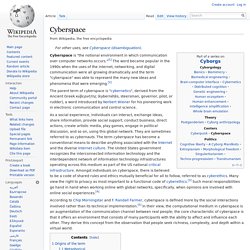
"[1] The word became popular in the 1990s when the uses of the internet, networking, and digital communication were all growing dramatically and the term "cyberspace" was able to represent the many new ideas and phenomena that were emerging.[2] The parent term of cyberspace is "cybernetics", derived from the Ancient Greek κυβερνήτης (kybernētēs, steersman, governor, pilot, or rudder), a word introduced by Norbert Wiener for his pioneering work in electronic communication and control science.
As a social experience, individuals can interact, exchange ideas, share information, provide social support, conduct business, direct actions, create artistic media, play games, engage in political discussion, and so on, using this global network. TEDxVictoria - Alexandra Samuel: Ten Reasons to Stop Apologizing for your Online Life. The Real and the Loss of Cyberspace. Last week, I wrote a piece entitled “There is no Cyberspace,” where I argued the today’s World Wide Web bears little resemblance to the thing that cyberpunk authors like William Gibson imagined as cyberspace.
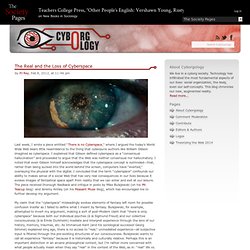
I explained that Gibson defined cyberspace as a “consensual hallucination” and proceeded to argue that the Web was neither consensual nor hallucinatory. I noted that even Gibson himself acknowledges that the cyberspace concept is outmoded—that, rather than being sucked into the world behind the screen, computers have “everted,” overlaying the physical with the digital. I concluded that the term “cyberspace” confounds our ability to makes sense of a social Web that has very real consequences in our lives because it evokes images of fantastical space apart from reality that we can enter and exit at our leisure. The piece received thorough feedback and critique in posts by Mike Bulajewski (on his Mr. Credit: Werner Kunz. The Myth of Cyberspace. In the early 1980s, when personal computing first became a reality, the faces of glowing terminals had an almost magical aura, transubstantiating arcane passages of 1s and 0s into sensory experience.
In fact, the seemingly impenetrable complexity of what was unfolding behind the screen created a sense of mystery and wonderment. We were in awe of the hackers who could unlock the code and conjure various illusions from it; they were modern magicians who seemed to travel between two worlds: reality and cyberspace. Speculative Fiction, Atemporality, and Augmented Reality. “The future is there,” Cayce hears herself say, “looking back at us. Trying to make sense of the fiction we will have become. And from where they are, the past behind us will look nothing at all like the past we imagine behind us now.”
–William Gibson, Pattern Recognition“This is a kind of writing which simply makes you feel very strange; the way that living in the late twentieth century makes you feel, if you are a person of a certain sensibility.” –Bruce Sterling, “Slipstream”, SF Eye #5, July 1989 I first read William Gibson’s Pattern Recognition almost a year ago, after a long hiatus from his work. Experience that I always find somewhat refreshingly like exploring a dark, richly appointed room with a small flashlight. And then something rather interesting happened. The divided categories of time have no intrinsic meaning aside from that which we give them through our perceptions of them–through our stories about them.
But who cares what kinds of stories we tell? National Geographic Assignment Blog.